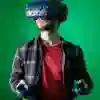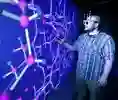



Study at a University with a proud heritage in gaming – on a course that will set you up for a career in this multi-billion-pound industry.
You’ll be taught an inspiring combination of computer science and games programming, learning within industry-standard facilities.
The skills, experience and technical expertise you’ll gain are highly sought after by employers. No wonder we’ve been providing the games industry with quality graduates for more than 20 years.
About this course
Gain a solid grounding in computer science, set within the context of games programming on this British Computer Society accredited degree.2
You’ll get to focus on parallel and concurrent programming, artificial intelligence, graphics and games architectures. Then in your third year, you’ll have the chance to complete a large project in an area of your choice.
Our facilities are kitted out with latest industry-standard equipment, including high-performance workstations, gigabit networking, 3D printers, robots, a 3D immersive cube, motion capture, AR, VR and MR.
Pursue your interest in gaming beyond the lecture theatre with our societies and extra-curricular opportunities such as games jams, hackathons and programming competitions. You could compete in international events like the Microsoft Imagine Cup. Or rise to the challenge of creating a computer game over a weekend in our Three Thing Game.
You’ll benefit from our strong links with companies like EA, Sony and Black Marble with frequent talks by experts in the trade. Many of them our own graduates working around the world. And gain outstanding tech industry experience on a paid placement year with the likes of BT, BAE Systems, Microsoft or IBM.
We take fun and games seriously.
Module options
Our five undergraduate Computer Science courses share the same compulsory modules in the first year. This gives you a foundation of knowledge across the whole subject area and the chance to explore what really interests you. You're then better placed to choose your modules in the later years of our BSc Computer Science, or switch to a different pathway to specialise in games programming, software engineering, robotics or AI.
Filters
Programming Portfolio
Gain the practical knowledge to design, implement and test algorithms. The module uses lectures to deliver concepts, a practice lab to apply the programming concepts learnt by developing programs to solve problems. You will take part in hands-on practical assessments, which will enable you to acquire extensive programming skills in an industry standard programming language. We will support you whether you are new to programming or have existing skills.
core
40 credits
Algorithms and Data Structures
Start to think like a computer. This module explores logic, data storage and algorithms with the use of practical demonstrations and activities. Operating in parallel with programming-focused modules, we will develop a toolkit of key concepts from a theoretical (non-code) perspective, facilitating a better understanding of these fundamentals. Topics to expect include pseudocode, state machines, essential keywords, common data structures, sort algorithms and search algorithms. You will learn methods to analyse and compare algorithms and their constituent parts in order that you may better design, evaluate and develop effective, efficient and performant software solutions.
compulsory
20 credits
Computational Thinking
This module, Computational Thinking, is essential for developing computer-based solutions. This module will enable you to develop your knowledge and understanding of the key mathematical underpinnings of computer science, to aid you in problem solving and programming. The development of your competence in logic, mathematics and statistics will also provide evidence of your numeracy and more advanced skills and is valued by employers.
compulsory
20 credits
Architectures, Operating Systems and the Cloud
In this module you will explore the fundamental properties of computers that allow them to execute programs. You will learn about how computers are made to work in hardware and simulation (virtual machines). A collection of virtual machines is a cloud, and this module allows you to get experience with the development of your own cloud using appropriate platforms.
compulsory
20 credits
Professional Development
Employers want much more than discipline-specific skills. This module sets you up to grow your professional skills and awareness, when working both individually and as part of a team. Develop your appreciation of the challenges within the sector, and how technology can help to solve worldwide issues. Begin a personal portfolio that you will add to over your degree. Work as part of a team to produce a design prototype, demonstrating your personal professional development. Through researching your discipline, you will understand the range of career roles available and what you need to do to progress in them.
compulsory
20 credits
Advanced Programming
In this module you will explore advanced techniques in programming as well as building an understanding of how high level objected-oriented languages are executed on a modern CPU. C++ will be used extensively, but we with reflect back on C#, as well as throwing in some assembly language.
compulsory
20 credits
eXtended Reality Development
eXtended Reality is a blend of physical and virtual environments, unlocking natural and intuitive 3D human, computer, and environment interactions. You will learn concepts and techniques in the field of mixed reality and user-centred testing. You will implement eXtended Reality applications using technologies applicable to the problem domain and use an eXtended Reality application to conduct a user test, analyse and report on results.
compulsory
20 credits
Graphics Programming
Programming 3D graphics in a virtual world is a cornerstone of games programming. In this module you will use the a graphics framework to begin to learn about the graphics pipeline, and to render models in 3D space.
compulsory
20 credits
Artificial Intelligence
Data is one of the 21st century’s most valuable commodities. In this module you will learn how to analyse, validate and interpret it to inform decision making. You will implement artificial intelligence techniques to solve a real world problem. Nationally, there is a widely recognised shortage of qualified Artificial Intelligence (AI) and data scientists to meet the needs of industry.
compulsory
20 credits
Our facilities


Watchlist
BSc Computer Science for Games Programming
Course overview
2 mins
See our incredible labs
Course Highlight
2 mins
Rand Nessif
Unsame Stories
2 mins
Featured academics
You’ll be taught by talented researchers whose specialist areas include computational science; computer gamification; dependable intelligent systems; robotics and artificial intelligence; and simulation and visualisation.

Dr Simon Grey
Lecturer
One of our Computer Science lecturers, Simon specialises in games, graphics and physical simulation. He’s passionate about games programming and games design and a big fan of our extra-curricular game jams and coding competitions.

Warren Viant
Lecturer
Warren’s work in computer systems simulation and modelling includes research for British Aerospace, a range of computer-assisted medical systems projects and the creation of a Virtual Incident Command training system for the Fire and Rescue Service.
Entry Requirements
What do I need?
This course is currently available through Clearing, which means our entry requirements are a bit different to what they would normally be.
At Hull, you're a name not a number. During Clearing, we look at all of your qualifications and experience, not just your academic grades. We may be able to offer you a place whatever your situation. Get started by completing our eligibility checker, and find out immediately if you could study at the University of Hull.
Have questions? Our admissions team will be happy to help.
Fees & Funding
How much is it?

Future prospects
You’ll leave us prepared for a career in the multibillion-pound games industry. Many of our graduates are company directors and technical leads in the business. This relationship with industry enhances our course content, keeping it current. It also means there’s an extensive network of Hull graduates working in the games industry across the world for you to tap into.
Graduate careers include games developer, mobile app developer, software engineer, IT security specialist, computer systems analyst and web developer.
Our graduates have been recruited by the likes of Codemasters, Criterion (Electronic Arts), Eutechnyx, Rare (Microsoft), Sony and Bohemia Interactive. Some of our Computer Science graduates move on to further study with an MSc or PhD, while others have gone on to set up and grow their own tech businesses.
Become part of the next generation of futuremakers
Like what you've seen? Then it's time to apply.
The standard way is to apply through UCAS. This will give you the chance to showcase your skills qualities and passion for the subject, as well as providing us with your academic qualifications.
Not ready to apply yet?
Visit our next Open Day, and see all that the University of Hull has to offer. Talk to our lecturers about your subject, find out what university is really like from our current students, and take a tour of our beautiful campus and amazing facilities.
You may also be interested in...
90% employability (Computer Science) UK domicile full-time first degree leavers; Higher Education Graduate Outcomes statistics, for the academic year 2022/23, published by the Higher Education Statistics Agency June 2025.
Accredited by BCS, The Chartered Institute for IT, for the purposes of fully meeting the academic requirement for registration as a Chartered IT Professional, and partially meeting the academic requirement for a Chartered Engineer (for MEng, fully meeting the requirement for a Chartered Engineer).
Computer games and animation: Ranked 12th in the UK for academic support. National Student Survey (NSS) 2025, HEIs only
All modules presented on this course page are subject to availability and this list may change at any time.